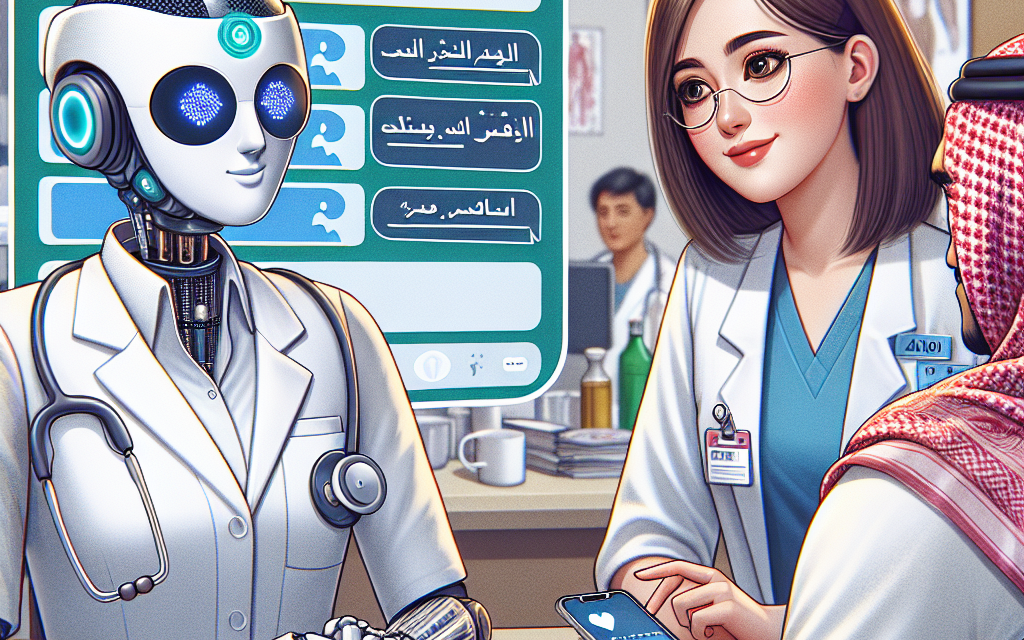AI Chatbots Enhance Patient Interaction and Alleviate Clinician Burden, Research Reveals
The integration of artificial intelligence (AI) in healthcare has transformed the way patients interact with medical professionals and how clinicians manage their workloads. AI chatbots, in particular, have emerged as a powerful tool to enhance patient engagement and alleviate the burden on healthcare providers. This article delves into the multifaceted role of AI chatbots in healthcare, exploring their impact on patient interaction, clinician workload, and overall healthcare delivery. We will examine five key areas: the evolution of AI chatbots in healthcare, their role in patient engagement, the reduction of clinician burden, case studies showcasing successful implementations, and the future of AI chatbots in the healthcare landscape.
The Evolution of AI Chatbots in Healthcare
The journey of AI chatbots in healthcare began with simple rule-based systems that could respond to predefined queries. Over the years, advancements in natural language processing (NLP) and machine learning have enabled the development of sophisticated chatbots capable of understanding and responding to complex patient inquiries.
Initially, chatbots were primarily used for appointment scheduling and basic information dissemination. However, as technology evolved, so did their capabilities. Modern AI chatbots can now:
- Provide personalized health information
- Assist in symptom checking
- Facilitate medication management
- Offer mental health support
- Guide patients through pre- and post-operative care
One of the significant milestones in the evolution of AI chatbots was the introduction of machine learning algorithms that allow these systems to learn from interactions and improve over time. For instance, chatbots like Ada Health and Buoy Health utilize AI to analyze user inputs and provide tailored health assessments, making them invaluable tools for both patients and clinicians.
Moreover, the COVID-19 pandemic accelerated the adoption of AI chatbots in healthcare. With social distancing measures in place, many healthcare providers turned to chatbots to maintain patient engagement and provide essential services without the need for in-person visits. This shift not only highlighted the versatility of chatbots but also underscored their potential to enhance healthcare delivery in times of crisis.
The Role of AI Chatbots in Patient Engagement
Patient engagement is a critical component of effective healthcare delivery. Engaged patients are more likely to adhere to treatment plans, attend follow-up appointments, and communicate openly with their healthcare providers. AI chatbots play a pivotal role in fostering this engagement through various means.
One of the primary functions of AI chatbots is to provide patients with immediate access to information. Patients often have questions about their conditions, treatment options, and medications. Chatbots can deliver accurate information quickly, reducing the time patients spend searching for answers. For example, a study published in the Journal of Medical Internet Research found that patients who interacted with chatbots reported higher satisfaction levels due to the immediate responses they received.
Additionally, AI chatbots can facilitate ongoing communication between patients and healthcare providers. They can send reminders for medication adherence, follow-up appointments, and preventive screenings. This proactive approach helps keep patients engaged in their care and encourages them to take an active role in managing their health.
Furthermore, chatbots can collect valuable data on patient preferences and behaviors. By analyzing this data, healthcare providers can tailor their services to meet the specific needs of their patient population. For instance, if a chatbot identifies that a significant number of patients are struggling with medication adherence, providers can implement targeted interventions to address this issue.
Moreover, AI chatbots can enhance patient education by providing resources and information tailored to individual needs. For example, a chatbot designed for diabetes management can offer personalized dietary recommendations, exercise tips, and blood sugar monitoring guidance. This level of customization not only empowers patients but also fosters a sense of ownership over their health.
Reducing Clinician Burden with AI Chatbots
The healthcare industry is facing an unprecedented burden due to increasing patient volumes, administrative tasks, and clinician burnout. AI chatbots offer a solution by streamlining various processes and allowing clinicians to focus on what they do best: providing care.
One of the most significant ways chatbots alleviate clinician burden is by automating routine tasks. For instance, chatbots can handle appointment scheduling, patient triage, and follow-up reminders, freeing up valuable time for healthcare providers. A study conducted by the American Medical Association found that clinicians spend nearly 50% of their time on administrative tasks, which could be significantly reduced through the use of AI chatbots.
Additionally, chatbots can assist in patient triage by gathering essential information before a clinician sees the patient. By asking targeted questions about symptoms and medical history, chatbots can help prioritize cases based on urgency. This not only improves patient flow but also ensures that clinicians can allocate their time and resources more effectively.
Moreover, AI chatbots can provide clinicians with real-time data and insights about their patients. For example, if a chatbot detects that a patient is experiencing worsening symptoms, it can alert the clinician, allowing for timely intervention. This proactive approach can lead to better patient outcomes and reduce the likelihood of complications.
Furthermore, chatbots can serve as a valuable resource for clinicians themselves. They can provide quick access to clinical guidelines, drug interactions, and treatment protocols, enabling healthcare providers to make informed decisions efficiently. This support can be particularly beneficial in high-pressure situations where time is of the essence.
Case Studies Showcasing Successful Implementations
Numerous healthcare organizations have successfully implemented AI chatbots to enhance patient interaction and alleviate clinician burden. These case studies provide valuable insights into the practical applications of chatbots in real-world settings.
One notable example is the use of the chatbot “Molly” at the University of California, San Francisco (UCSF). Molly was designed to assist patients with chronic conditions by providing personalized health information and support. The chatbot was integrated into UCSF’s electronic health record system, allowing it to access patient data and deliver tailored recommendations. As a result, UCSF reported a 30% increase in patient engagement and a significant reduction in appointment no-shows.
Another compelling case study comes from the UK’s National Health Service (NHS), which implemented a chatbot named “Ask NHS.” This chatbot was designed to help patients navigate the healthcare system by answering common questions and directing them to appropriate services. Within the first year of its launch, Ask NHS handled over 1 million inquiries, significantly reducing the burden on call centers and improving patient access to information.
In addition, the chatbot “Woebot” has gained attention for its role in mental health support. Woebot uses cognitive-behavioral therapy techniques to engage users in conversations about their mental health. A study published in the Journal of Medical Internet Research found that users reported a 30% reduction in symptoms of depression and anxiety after interacting with Woebot for just two weeks. This case highlights the potential of AI chatbots to provide effective mental health support while alleviating the burden on mental health professionals.
These case studies illustrate the diverse applications of AI chatbots in healthcare and their potential to enhance patient interaction while reducing clinician workload. As more organizations adopt these technologies, the evidence supporting their effectiveness continues to grow.
The Future of AI Chatbots in Healthcare
The future of AI chatbots in healthcare is promising, with ongoing advancements in technology and increasing acceptance among patients and providers. As AI continues to evolve, we can expect chatbots to become even more sophisticated and capable of addressing a broader range of healthcare needs.
One of the key trends shaping the future of AI chatbots is the integration of voice recognition technology. Voice-activated chatbots can provide a more natural and intuitive user experience, allowing patients to interact with the system using their voice. This development could be particularly beneficial for elderly patients or those with disabilities who may struggle with traditional text-based interfaces.
Additionally, the use of AI chatbots in telehealth is expected to expand significantly. As telehealth becomes more mainstream, chatbots can play a crucial role in facilitating virtual consultations, triaging patients, and providing follow-up care. This integration can enhance the overall telehealth experience for both patients and clinicians.
Moreover, as healthcare organizations increasingly focus on personalized medicine, AI chatbots will likely play a vital role in delivering tailored health interventions. By analyzing patient data and preferences, chatbots can provide customized recommendations that align with individual health goals and needs.
However, the future of AI chatbots in healthcare also raises important ethical considerations. Issues related to data privacy, security, and the potential for bias in AI algorithms must be addressed to ensure that these technologies are used responsibly and equitably. Healthcare organizations must prioritize transparency and accountability in their use of AI chatbots to build trust among patients and providers.
Conclusion
AI chatbots have emerged as a transformative force in healthcare, enhancing patient interaction and alleviating clinician burden. Through their ability to provide immediate access to information, facilitate ongoing communication, and automate routine tasks, chatbots are reshaping the healthcare landscape. The evolution of these technologies, coupled with successful case studies and promising future trends, underscores their potential to improve healthcare delivery and patient outcomes.
As healthcare organizations continue to adopt AI chatbots, it is essential to prioritize ethical considerations and ensure that these technologies are used responsibly. By doing so, we can harness the full potential of AI chatbots to create a more efficient, patient-centered healthcare system that benefits both patients and clinicians alike.





